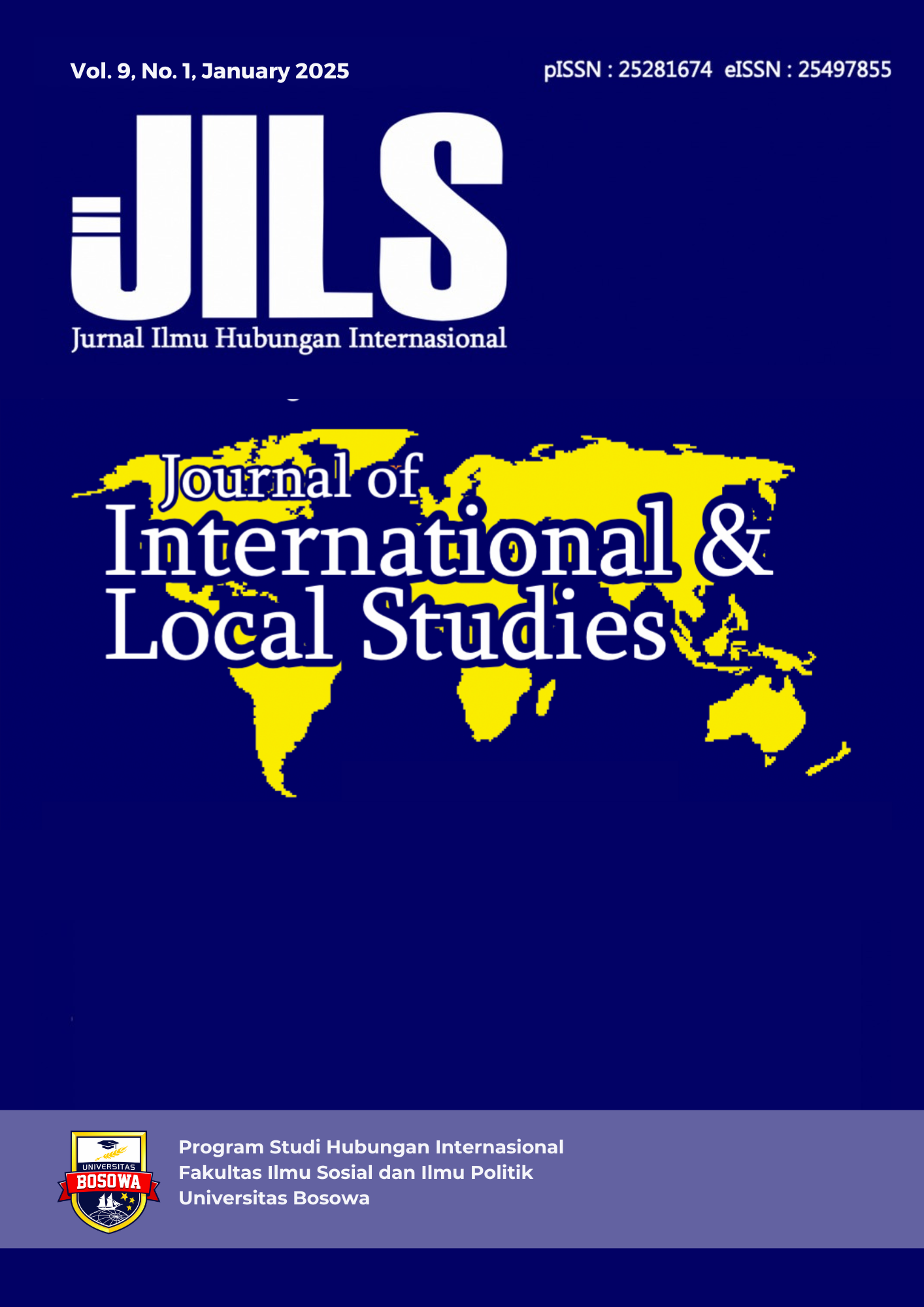Peran Afghanaid dalam Pengentasan Kemiskinan di Afghanistan Tahun 2015-2020
DOI:
https://doi.org/10.56326/jils.v9i1.4511Keywords:
Afghanistan, Afghanaid, poverty, international organization, SDGsAbstract
Afghanaid is an international organization working in the humanitarian sector to overcome poverty in Afghanistan for more than 40 years. This research aims to find out and explain the role of Afghanaid in helping to eradicate poverty in Afghanistan based on 2015-2020. The research method used in this research is descriptive-qualitative, based on previous research, books, journals and libraries, which carry out similar research by collecting data through several sources in the form of documents. Most of the data used in this research was obtained through the official Afghanaid website and several research journals that discuss poverty in Afghanistan. The results of this research show that the success of the Afghanaid program is highly dependent on long-term funding and resources needed to achieve the poverty alleviation target. As a forum, Afghanaid has created collaboration with local and international parties. Still, unfortunately, Afghanaid has not succeeded in producing specific policies through this collaboration that can be used as guidance by its members. Resources are also the main obstacle to success, which is used as poverty alleviation based on cooperation and only focuses on internal policies.
References
Adam, M. D. A., Nababan, F. A., Abror, M. Y., & Yusa, M. Y. (2022). Peran Women’s International League for Peace and Freedom dalam pemberdayaan perempuan Afghanistan. Transformasi Global, 9(1), 54–69. https://doi.org/10.21776/ub.jtg.009.01.5
Afghanaid. (2023). SDGs 1 in Afghanistan: No poverty. Retrieved from https://www.afghanaid.org.uk/
Anggrela, F., & Sugara, R. (2024). United Nations Office on Drugs and Crime (UNODC) melalui program GLO. ACT Asia dan Timur Tengah dalam mengatasi perdagangan manusia dan penyelundupan migran. Indonesian Journal of International Relations, 8(2), 452–479. https://doi.org/10.32787/ijir.v8i2.522
Angstrom, J., & Honig, J. W. (2012). Regaining strategy: Small powers, strategic culture, and escalation in Afghanistan. Journal of Strategic Studies, 35(5), 663–687.
Azizi, W. (2021). How corruption played a role in the demise of the Afghan government. The Diplomat.
Azura, R., & Munir, F. (2023). Peran United Nations High Commissioner for Refugees (UNHCR) dalam proses resettlement pengungsi asing di Indonesia (studi kasus pengungsi Afghanistan di Kota Pekanbaru). Journal of Diplomacy and International Studies, 51–64. https://doi.org/journal.uir.ac.id/
Burns, R. (2021). Billions spent on Afghan army ultimately benefited Taliban. US News 17. Retrieved from https://apnews.com/article/joe-biden-army-taliban-995b069a9008690582cb34f4cacd8515
Faizin, M. I. (2020). Peran Nahdlatul Ulama dalam proses perdamaian di Afghanistan pada 2011-2018 (Unpublished undergraduate thesis). Universitas Islam Negeri Syarif Hidayatullah Jakarta.
Hudaya, M., Nira, F. P., & Putri, R. A. (2024). Di balik kekalahan militer Afghanistan terhadap Taliban: Sudut pandang budaya strategis Afghanistan. Jurnal Hubungan Internasional, 17(1), 24–45. https://doi.org/10.20473/jhi.v17i1.44592
Hurd, I. (2014). International organizations: Politics, law, practice. Cambridge University Press.
Istiyani, N. (2024). Perspektif feminisme dalam upaya Indonesia terlibat proses perdamaian Afghanistan melalui pemberdayaan perempuan periode 2017-2020. Universitas Islam Negeri Syarif Hidayatullah Jakarta. https://doi.org/repository.uinjkt.ac.id/
Khan, H. U., Shah, M. F., & Khan, M. I. (2023). Shanghai Cooperation Organisation and Afghanistan: Interests and limitations. Margalla Papers, 27(1), 82–95. https://doi.org/margallapapers.ndu.edu.pk/site
Maudina, V. (2023). Implementasi kebijakan World Food Programme dalam mengatasi krisis pangan di Afghanistan tahun 2018-2022. Universitas Islam Indonesia, 16. https://doi.org/https://dspace.uii.ac.id/handle/123456789/42396
Natalia, A., & Maulidya, E. N. (2023). Aktualisasi empat pilar Sustainable Development Goals (SDGs) di perdesaan Kecamatan Natar Kabupaten Lampung Selatan. JIIP: Jurnal Ilmiah Ilmu Pemerintahan, 8(1), 21–41. https://doi.org/10.14710/jiip.v8i1.16513
Nauli, B. P. (2021). Masa depan kerja sama Selatan-Selatan: Di antara solidaritas dan kepentingan. Universitas Indonesia, 3(12), 2517–2531. https://doi.org/10.46799/syntax-idea.v3i12.1661
Prime Essay. (2020). Afghanistan as a buffer state. Retrieved from https://primeessays.com/
Rikza, A. (2021). Reposisi agama dalam perang: Peran Nahdlatul Ulama dalam usaha mendukung transformasi konflik. Journal of Integrative International Relations, 6, 17–36. https://doi.org/10.5281/zenodo.8278371
Setiyono, B. (2024). Pengantar ilmu politik. Bumi Aksara. Retrieved from https://www.academia.edu/
Shultz, R. H. (2012). Strategic culture and strategic studies: An alternative framework for assessing al-Qaeda and the global jihad movement. Political Science.
Suasta, R. D. (2017). Afghanistan tuding Iran pasok roket untuk Taliban. CNN Indonesia. Retrieved from https://www.cnnindonesia.com/internasional/20170124143919-120-188571/
Viska, A. D. (2022). Abstrak peran United Nations Children’s Fund (UNICEF) dalam menangani persoalan tentara anak (child soldier) di Republik Demokratik Kongo, 2013–2020. Universitas Lampung. https://doi.org/digilib.unila.ac.id/63699/
Wijaya, P. (2021). Negaranya miskin, tapi Afghanistan kaya sumber daya alam dari emas sampai lithium. Merdeka.com. Retrieved from https://www.merdeka.com/
Downloads
Published
How to Cite
Issue
Section
License
Copyright (c) 2025 Reski Anriyani, Beche Bt. Mamma

This work is licensed under a Creative Commons Attribution 4.0 International License.


